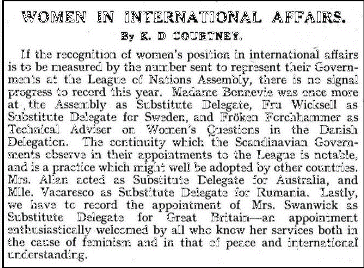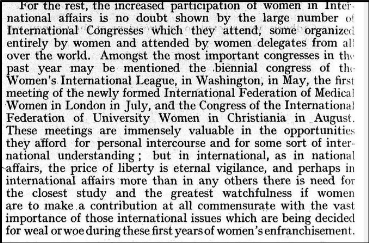| By Alyssa Anderson, Gale Ambassador at Florida International University |
In a world of restrictive gender roles, women are assumed to play a peripheral part while men take the lead. Feminism was introduced as a critical theory in the study of international relations to defy the marginalization of women in the field. To focus on international relations through a feminist viewpoint, students must recognize how inequality affects women within global politics.
To explore this topic, let’s trek through my findings from Gale Primary Sources, Gale OneFile: Contemporary Women’s Issues, and Gale In Context: Global Issues, examining the past, present, and future of feminism in international relations.
Understanding the Past
To start my research, I cross-searched Gale Primary Sources to access historical archives on feminism in international relations during the twentieth century. I recognized the integral yet largely overlooked involvement of women in global politics during the past and compared this with the present.

This primary source paints a picture of the early days of women’s involvement in the League of Nations—an important international organization and forerunner to the United Nations—and other political assemblies during the twentieth century. It sums up the participation of women in the League as “no signal progress to record this year,” insinuating that their involvement was starkly limited. At the time, many governments did not allow women to represent them politically.

In the early twentieth century, women increasingly attended many other international conferences, including the Women’s International League. Yet despite their political aptitude, the author suggested they should observe with the “greatest watchfulness,” referring to their need to catch up with men. This subtly implies they were still perceived as less informed than their male counterparts regardless of their apparent participation and contributions.
Women’s political involvement was highly restricted. This discrimination undermined their voices in foreign affairs and blocked them from making an impact. Since then, there has been significant headway; however, the present day reveals there’s still much room for improvement.
Standing in the Present
To continue my research, I accessed the Gale OneFile: Contemporary Women’s Issues database to clarify the feminist perspective of international relations in the twenty-first century. Decades of activism for women’s rights and empowerment have paved the way for improved gender parity in global politics today, but women are still largely underrepresented worldwide.

This article claims that foreign affairs is male-centric, emphasizing the exclusion of women and the overrepresentation of men in global political spaces. It also suggests that studying international relations through a feminist lens includes understanding the viewpoints and contributions of women in theory and practice.

Feminism in international relations today carries unique viewpoints that introduce new sentiments to global political issues like war. For example, since women suffer disproportionate risks of gender-based violence during wars, feminists advocate for the safety of women in conflicts to prevent these abuses. This perspective has helped strengthen international legal protections for women during wars, challenging the patriarchal landscape of foreign affairs.
Present-day problems such as marginalization, disempowerment, and violence stem from deeply embedded patriarchal values. As feminists continue to point out these issues and fight for equality, the field of international relations may one day become more inclusive.
Walking Toward the Future
To wrap up my research, I pinpointed the Gale In Context: Global Issues database for more insights on the feminist perspective of international relations as it evolves with our rapidly changing world. The future of feminism emphasizes structural change to achieve gender parity through the revision of gender roles and meaningful participation of women in global politics.

This article discusses the impact of patriarchal systems and gender inequality. It claims that masculinity is heralded as the model expression of foreign policy, causing traditionally
masculine traits such as violence, aggression, and hierarchy to be idealized. In contrast, femininity is undervalued in foreign policy because it’s associated with passivity, showing the inherent bias women face in politics.

To advocate for structural change, women need to occupy more influential positions of power rather than just being included in political spaces. With women asserting greater power, patriarchal values will diminish over time and issues such as gender-based violence, workplace discrimination, and reproductive justice will be better addressed.
Through years of continued activism, the future may finally hold women’s empowerment and gender parity. Until then, students can make an impact by crediting the feminist perspective of international relations for standing against inequality.
Concluding Our Journey
Studying international relations from a feminist perspective involves addressing the impact of inequality on women in global politics. In the face of historical and present-day marginalization, embracing women’s political power and contributions will lead to a more inclusive future in foreign affairs.
Related Blogs
If you enjoyed reading about “The Past, Present & Future of Feminism in International Relations,” check out these posts:
- Appreciating Daring Exploits by Women
- Research Women’s Rights with Gale Academic OneFile
- How to Honor Champions of Women’s Equality

About the Author
Alyssa Anderson is this year’s Gale Ambassador at Florida International University! She is in her junior year and majors in International Relations. She is also a dedicated honor student and has a keen interest in global affairs, politics, and history. Passionate about promoting library resources and empowering students, she believes that access to quality information is the key to academic excellence. Outside of her studies, Alyssa is a globetrotter who finds joy in exploring new cultures, learning languages, and expressing herself through dance. LinkedIn Profile URL: https://linkedin.com/in/alyssa-anderson-655ba6241

